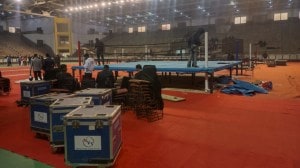China outnumbered, tigers can146;t be bred in captivity
A conference of parties to the Convention on International Trade in Endangered Species, being held at The Hague, the Netherlands

A conference of parties to the Convention on International Trade in Endangered Species CITES, being held at The Hague, the Netherlands, today passed a resolution that tigers should not be bred in captivity for body parts. The resolution was moved by India, China, Nepal and the Russian Federation. It urged Beijing to resist pressure from tiger farm owners to scrap a 14-year ban on using tigers for traditional medicines.
The resolution is in place for at least three years after which the next CITES conference will be held.
Conservationists hailed the decision by the 171-nation CITES as a victory for the big cats, only 5,500 of which survive in the wild.
After endorsing the draft resolution, China and some other parties to the convention wanted to move a few amendments but they were voted out. A change that they wanted was to insert the word 8220;international8221; before 8220;trade8221; in the sentence: 8220;Tigers should not be bred for trade in parts and derivatives.8221; But the amendment sought did not get the required vote. Had the amendment been passed it would have meant that domestic trade could continue.
Earlier, introducing the draft, India gave a status report of initiatives being taken to stop the trade and said they could not imagine a world where a ban on tiger parts trade is lifted and urged all parties to stop tiger farming. India found support from other Range countries, such as, Bhutan, Nepal, Russia and Thailand. Other countries affected by wildlife trade such as Switzerland, Kenya and Malawi also spoke up in support of the draft.
8220;It is good that India took the lead and did something good for the future of tigers. We stated openly that we do not support China8217;s contention on saving tigers by breeding them in farms as that would not necessarily stop the trade. It was difficult to convince them but the fact that we have issued a common resolution shows that they have agreed. And now they have no option but to phase out farm-bred tigers,8221; Rajesh Gopal, Member-Secretary of the National Tiger Conservation Authority, told The Indian Express from the Hague.
Another amendment was suggested by the EU, which wanted the word 8220;parties8221; replaced with the words 8220;Range states8221; in the sentence: 8220;Parties with intensive operations breeding tigers on a commercial scale shall implement measures to restrict the captive population to a level supportive only to conserving wild tigers.8221;
8220;This would have meant that someone can set up a farm in a country, which is not a Range state and breed tigers. Russia pointed this out but those in favour of adopting the words 8220;Range states8221; could not get the required two thirds majority,8221; said a press release by the International Fund for Animal Welfare IFAW.
8220;Today8217;s meeting has closed the chapter on even domestic trade in tiger parts in China. Till now, they were speculating and agreed to the resolution to save their face. They wanted to get away with it internally but the voting ruled that out. Now, the question that stares China in the face is what to do with its 5000 farm-bred tigers. They have spent a lot of money on them so obviously culling would be a major problem,8221; said Ashok Kumar from the NGO Wildlife Trust of India, who is also participating in the conference.
- 01
- 02
- 03
- 04
- 05






























